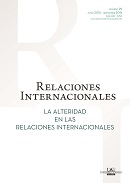The other as past and present: beyond the logic of ‘temporal othering’ in IR theory
Keywords:
Temporal othering , IR theory , Kojève’s reading of Hegel , Theory of Subject from AgambenCopyright (c) 2015 Sergei PROZOROV

This work is licensed under a Creative Commons Attribution-NonCommercial-NoDerivatives 4.0 International License.
Abstract
The article ventures a critique of the logic of ‘temporal othering’ in contemporary International Relations (IR) theory. Originally articulated in the field of European integration, this logic presupposes a possibility for a political community to constitute its identity without any spatial delimitation by means of casting as Other its own past, whose repetition in the future it seeks to avoid. While the image of contemporary Europe as ‘othering’ its own past has been subjected to empirical criticism, this article makes a conceptual argument for the indissociability of temporal and spatial aspects in any act of othering. Drawing on Alexandre Kojève’s reading of Hegel, I argue that any historical action is necessarily spatiotemporal, combining the abstraction of temporal negation with the concrete actuality of a negated spatial being. Alternatives to the logic of sovereign territoriality are therefore not to be sought in the temporal aspect of othering, but rather by pursuing the possibility of self-constitution in the absence of any negating action whatsoever. The article concludes with an outline of such an alternative ethos, developed on the basis of Giorgio Agamben’s reconstruction of the Hegelian-Kojèvian problematic of the end of history and his theory of the subject.





